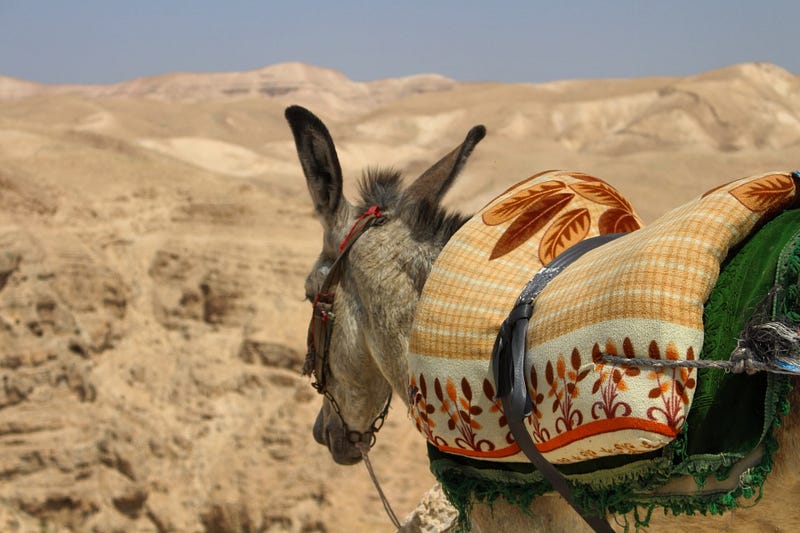It could save your life

Do you ever feel like some unseen force is blocking you? Self-help books, therapists or coaches might help you find a different way forward, but wait! Maybe the world wants you to do something else. That happened to the prophet Balaam in the Bible, and we can still learn from his 3000-year old story.
Like all Bible stories, Balaam’s is best read as poetry, not as literal truth. You don’t have to believe in God to learn from it. Like other spiritual wisdom — Muslim teachers say each verse in the Koran has seven different meanings — Balaam has layers of meaning that will speak to us at different stages of our lives. This story will look at two of those meanings.
First, the story
As told in the Book of Numbers, the Israelites were swarming out of the desert toward the Land of Canaan, conquering the little kingdoms of Midian in their path. The local leaders were terrified of them, and one, Balak the king of Moab, decided to stop their advance by force.
Balak knew he needed help, so he called on the prophet Balaam to come and rouse the people of Moab to fight, and to curse the Israelites. He offered Balaam a ton of money and honors. After first refusing, Balaam got on his ass and rode off toward Moab.
They were making good time, until the ass turned off the road and wandered into a nearby field. Balaam didn’t know that God, taking Israel’s side as usual, had sent a death angel to block the prophet’s path. Balaam couldn’t see the angel standing up ahead with its sword drawn, ready to kill him, but his ass could.
Not seeing the donkey’s motive, Balaam got angry, beat her with a stick and drove her back into the road.
This happened a second time. Finally, in a very narrow place with no way to turn off the road, the ass “fell down under Balaam: and Balaam’s anger was kindled, and he smote the ass with a staff” (Number 22:27.) Then she started talking to him.
“What have I done unto thee” she asked, “that thou hast smitten me these three times?”
And Balaam said unto the ass, “Because thou hast mocked me: I wish there were a sword in mine hand, so I could kill thee.”
“And the ass said unto Balaam, ‘Am not I thine ass, upon which thou hast ridden ever since I was thine unto this day? Did I ever disobey you before?” (Numbers 22:28–30.)
Balaam admitted that she had never done anything like this before. Maybe, then, he should have wondered why she was behaving differently now, but he wanted to get to Moab and wouldn’t tolerate anyone getting in his way, least of all an animal. How human! How male!
Then, the book says, “God opened Balaam’s eyes so he could see the angel standing in front of him. The angel of the Lord said unto him, “Behold, I went out to withstand thee, because thy way is perverse before me. And the ass saw me, and turned from me these three times. Unless she had turned from me, surely by now I had slain thee, and saved her alive.”
The world talks to us
The world, or God if you prefer, sends us important messages all the time. We have to decide whether to listen and what they mean. Then we can do something about them.
Sometimes people or events just happen to interfere with our plans for no apparent reason. Other times, blessings come from nowhere and encourage us in some direction. We should look into those events to see if we can understand a message there.

Often, the messages come from our bodies. According to Martin Rossman MD, co-founder of the Academy for Guided Imagery, our bodies can’t speak to us in words, so they communicate through symptoms and dreams. If we ignore the symptoms or try to suppress them, we may miss a chance to avert a catastrophe. Interactive Guided Imagery is a way of letting your body or your symptoms speak in words.
People often can’t see how things in life, like a person, a drug, a food, or a job, are bad for us. We just know we’re tired in the morning or having pain somewhere in our bodies. Those feelings are God/the world speaking to us. If we keep pushing, like Balaam tried to do, we won’t like the results.
Men often treat their bodies like Balaam treated his ass. They may have a very narrow concept of their sexuality, limited to getting hard and penetrating things. If their aging bodies no longer want to do that, they might seek assistance from medicines. Or they may withdraw from sex completely rather than try new activities that might be more pleasurable than what they had before.
Sometimes, the blocks seem psychological. I used to be a serious competitive chess player. I reached the rank of national master in the United States, but I wanted more. Chess took up huge amounts of my time and energy: practicing, studying, competing. It interfered with my relationships and other activities, but it was also fun. I was addicted.
A frustrating thing kept happening to me on the chessboard, though. I would laboriously build up a great position against another strong player, then suddenly, with victory in my grasp, make some senseless blunder and throw the game away. I would be left angry and frustrated with myself. What was going on?

Now I know these lapses were my body/mind trying to protect me, either from the consequences of success or from wasting my life pushing plastic pieces around a board.
Thirty years later, and after some good therapy, I think both were involved. With ongoing inner work, I’m more comfortable winning now, but I’m also very glad I didn’t pursue dreams of becoming a Grandmaster. The idea of a life spent poring over chess games doesn’t appeal to me nearly as much as the life I have had., either from the consequences of success or from wasting my life pushing plastic p
But I didn’t think any of that at the time. The blunders just came, like some outside force was doing it to me for no reason. I hated them and stressed out over them. I didn’t see that, like Balaam’s ass, they were trying to tell me something important.
How animals talk
Balaam wouldn’t listen to his donkey, who was trying to save him. In real life, animals can’t talk, and it’s hard for them to get our attention. They may try to let us know by their behavior. If a pet seems to dislike a new boyfriend, maybe he’s not the man you want.
Wild animals have behaviors too. If coyotes are coming to your neighborhood and eating pets, they are probably being driven out of their natural homes. Maybe we should help them protect their traditional spaces.
More often, wild animals just die. That’s all they can do to alert us to the angel of death we’re calling into being as we destroy their homes in search of wealth and growth. Are most of us even aware of the sharp declines in bird and bug populations over the last 50 years? Or do we ignore the quieting of bird songs and the absence of dead bugs on our windshields?
Learning to listen to the world
In Balaam’s story, God gave an animal the ability to speak, then opened Balaam’s eyes so he could see the angel of death. That doesn’t happen anymore. In modern life, though, we can open our eyes in other ways. We might learn to evaluate our path through therapy, or through a practice of meditation, prayer, or guided imagery. We might be on a good path but doing it wrong, or we might be better off changing direction, perhaps going back the way we came.
If the barriers are external, we might see the world more clearly if we get involved in a movement for change, because when we try to change the world, we can see how it reacts. That is why it’s so important, and rare, for people not to attach to their programs and preconceived ideas. We might have to change them.
Can we remain aware of what is happening and how people are responding, or will we, individually and collectively put our head down and keep beating our ass forward? We might get much better results when we learn to listen.
— — — — — — –
Thanks for reading! Follow me on Twitter, on Facebook or Medium.com/@davidsperorn. Hire me for freelancing, editing, or tutoring on Linked In

Enjoying revisiting some Old Testament tales, which, as you said, are so much better when I remind myself it’s not literal. I feel like it doesn’t even have to stretch too much to see talking donkeys and angels of death still occur! Again, it’s in our perception and the framing/re-telling of the tale with an emphasis on message. Thanks for routinely doing just that in an accessible way.